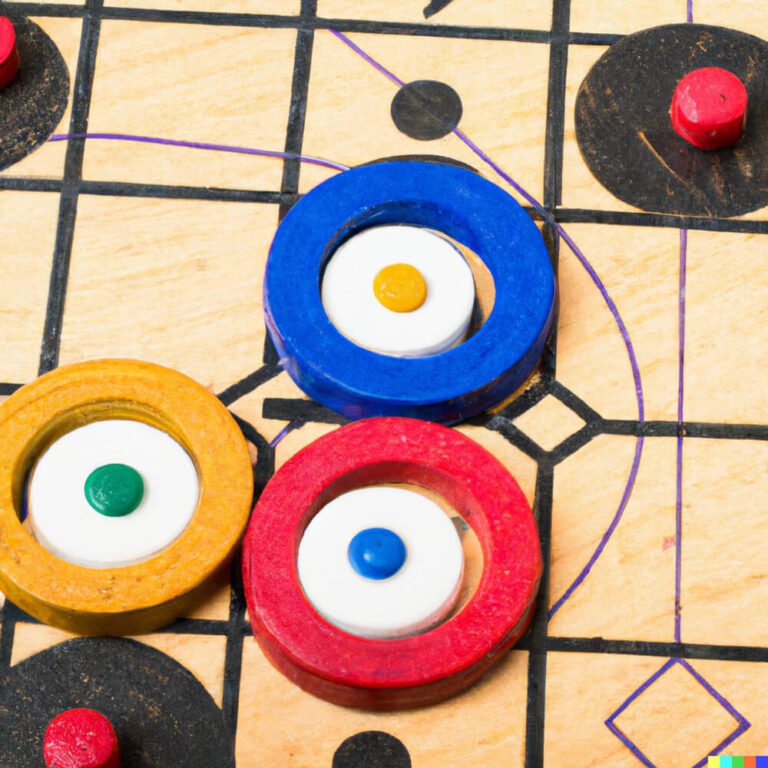Classic popular board games have been a staple in family gatherings and social interactions for decades. From the timeless appeal of Monopoly to the strategic challenges of Chess, these games have stood the test of time and continue to bring joy to people of all ages. In this article, we will delve into the nostalgia and timelessness of classic popular board games, exploring their history, evolution, cultural impact, and the benefits they offer.
The roots of classic popular board games can be traced back to ancient civilizations, where games like Senet in Egypt and Pachisi in India were played for entertainment and strategic skill. Over time, these traditional games evolved into modern-day favorites such as Scrabble, Clue, and Risk. Despite the advancements in technology and the rise of digital gaming, classic popular board games have maintained their allure and continue to thrive in today’s society.
In the subsequent sections of this article, we will take a closer look at the history of classic popular board games, highlighting their evolution from traditional to modern versions. We will also explore the top 5 most iconic classic popular board games, along with their cultural impact and the benefits they provide for cognitive development and bonding.
Additionally, we will discuss the rise of digital adaptations and provide tips for hosting a classic board game night that creates the perfect atmosphere for game nights with friends and family.
The History of Classic Popular Board Games
Board games have been a popular form of entertainment and social interaction for centuries, with evidence of early versions dating back to ancient civilizations such as Mesopotamia and Egypt. The origins of some classic popular board games can be traced to these ancient times, where they served as not only a source of amusement but also as tools for strategic thinking and decision-making. Throughout history, these games have evolved and adapted, eventually becoming the beloved favorites we know today.
In the 20th century, classic popular board games experienced a surge in popularity, with iconic titles such as Monopoly, Scrabble, Chess, Clue, and Risk captivating players around the world. Each of these games has its own unique history and cultural significance, contributing to their timeless appeal. For example, Chess is thought to have originated in India during the 6th century, evolving into the game we know today over the subsequent centuries.
As society progressed into the modern era, classic popular board games continued to hold their place in popular culture. The enduring appeal of these games speaks to their ability to stand the test of time and adapt to changing preferences while still retaining their core gameplay mechanics. Whether it’s through physical editions or digital adaptations, classic popular board games continue to captivate new generations while paying homage to their historical roots.
The Top 5 Most Iconic Classic Popular Board Games
Classic popular board games have stood the test of time and continue to be cherished by people of all ages. Here are the top 5 most iconic classic popular board games that have captured the hearts of millions:
- Monopoly: This game, first published in 1935, has become a staple in many households. Players buy, sell, and trade properties to become the wealthiest player.
- Scrabble: Created in 1938, this word game challenges players to create words from lettered tiles and earn points based on the letters used.
- Chess: With a history dating back over a thousand years, chess is a strategy game that continues to captivate players with its intricate gameplay and complex tactics.
- Clue: Also known as Cluedo in other countries, this murder mystery game requires players to solve a crime by deducing the suspect, weapon, and location of the crime.
- Risk: In this world domination game, players engage in strategic warfare to conquer territories and ultimately achieve global dominance.
These classic board games have transcended generations and have remained popular due to their timeless appeal and ability to bring people together for hours of entertainment and friendly competition. Whether it’s accumulating wealth in Monopoly or outwitting opponents in Scrabble, these games continue to be enjoyed by families, friends, and gaming enthusiasts alike. Their enduring popularity speaks volumes about their lasting impact on the world of board gaming.
How Classic Popular Board Games Have Evolved Over Time
Classic popular board games have stood the test of time, evolving from their traditional forms to modern adaptations that cater to the changing preferences of players. Let’s explore how these beloved games have adapted and changed over time.
The Evolution of Game Design
As technology has advanced, classic popular board games have undergone significant changes in their designs. From the use of higher quality materials to more intricate and detailed game boards and pieces, modern versions often boast a sleek and visually appealing aesthetic that enhances the overall gaming experience. Additionally, some games have introduced new elements such as electronic components or interactive features to cater to a tech-savvy audience.
Reworked Rules and Mechanics
In order to keep up with the interests of contemporary players, classic popular board games have often reworked their rules and mechanics. This may involve simplifying complex game mechanics for easier understanding or adding new and exciting gameplay elements to appeal to a younger demographic. For example, newer editions of classic board games such as Monopoly may introduce alternative gameplay modes or special power-ups to add a fresh twist to the familiar gameplay.
Digital Adaptations
The rise of digital adaptations has also played a significant role in the evolution of classic popular board games. Many well-known board games now have online or app versions that offer convenience and accessibility for players who prefer virtual gaming experiences. These digital adaptations often feature additional content, improved graphics, and online multiplayer capabilities, providing a new dimension to the way these classic games are enjoyed.
Overall, the evolution of classic popular board games has breathed new life into timeless favorites, ensuring that they remain engaging and relevant for generations to come.
The Cultural Impact of Classic Popular Board Games
Classic popular board games have played a significant role in shaping social interactions and family gatherings throughout history. These timeless games have provided people with opportunities to come together, engage in friendly competition, and create lasting memories. From the strategic gameplay of Chess to the suspenseful mystery of Clue, these board games have become staples in many households, bringing people of all ages together.
One of the key cultural impacts of classic popular board games is their ability to bridge generation gaps. These games have the unique power to transcend age differences, allowing grandparents, parents, and children to bond over a shared activity. Regardless of technological advancements, classic board games remain relevant in today’s society because they provide an avenue for face-to-face interaction and connection.
Furthermore, classic board games have also contributed to the development of important social skills. Games like Monopoly and Risk require negotiation, decision-making, and conflict resolution – skills that are essential for effective communication and cooperation. By engaging in these games, individuals learn how to be gracious winners, good sportsmanship in defeat, and how to strategize effectively – all valuable lessons that carry over into various aspects of life.
| Cultural Impact | Board Games |
|---|---|
| Bridge generation gaps | Chess |
| Social skill development | Monopoly |
The Benefits of Playing Classic Popular Board Games
Classic popular board games offer a myriad of benefits beyond just entertainment. Playing these games can greatly contribute to cognitive development, fostering bonding among friends and family, and providing an enjoyable form of entertainment for people of all ages. From improving critical thinking skills to promoting social interaction, the benefits of playing classic popular board games are numerous.
One key benefit of playing classic popular board games is the positive impact on cognitive development. Games like Chess, Scrabble, and Risk require strategic thinking, problem-solving, and decision-making skills. These games can improve memory, concentration, and mental flexibility as players strategize and anticipate their opponents’ moves. Additionally, traditional board games often involve mathematical concepts such as counting spaces or managing resources, which can further enhance cognitive abilities in both children and adults.
In addition to cognitive development, classic popular board games also have the ability to foster bonding among players. Whether it’s a family game night or a friendly gathering with friends, these games provide an opportunity for meaningful interactions and shared experiences. The collaborative nature of some games like Pandemic encourages teamwork and communication among players. Furthermore, the friendly competition that arises from playing these games can strengthen relationships and create lasting memories.
Lastly, classic popular board games offer a timeless form of entertainment that transcends generations. With the rise of digital technology, many people are turning to traditional board games as a way to disconnect from screens and engage in face-to-face interaction. The nostalgic appeal of these games combined with their ability to bring people together makes them a valuable source of enjoyment for families and social gatherings.
| Benefits | Examples |
|---|---|
| Cognitive Development | Chess, Scrabble, Risk |
| Bonding | Pandemic (Cooperative), Monopoly (Competitive) |
| Entertainment | All Classic Popular Board Games |
The Rise of Digital Adaptations of Classic Popular Board Games
Online Platforms
Online platforms such as Steam, Tabletopia, and Board Game Arena have become popular destinations for board game enthusiasts to play classic favorites with friends or other players from around the world. These platforms offer a wide range of classic board game titles and provide features like chat functions and multiplayer options to enhance the gaming experience.
Mobile Apps
In addition to online platforms, mobile apps have also contributed to the digital transformation of classic board games. Players can conveniently access these games on their smartphones or tablets, allowing for on-the-go entertainment and the ability to challenge friends regardless of physical distance. Apps like Words With Friends (a digital version of Scrabble) and Monopoly Classic bring beloved board games to the palm of your hand.
Enhanced Features
Digital adaptations of classic popular board games often come with enhanced features that add a modern twist while still maintaining the essence of the original game. From interactive animations to themed boards and customizable avatars, these features contribute to a more engaging and visually appealing gaming experience.
Overall, the rise of digital adaptations has not only made classic popular board games more accessible but has also introduced them to a new generation of players who may have otherwise missed out on these timeless favorites. As these digital versions continue to evolve, they are sure to remain an integral part of the gaming landscape for years to come.
Tips for Hosting a Classic Board Game Night
In conclusion, the resurgence of interest in classic popular board games highlights the timeless appeal of these traditional forms of entertainment. Whether it’s engaging in a heated game of Monopoly or testing your vocabulary with Scrabble, these iconic games have been enjoyed for generations and continue to bring people together.
As modern technology advances, the availability of digital adaptations has introduced a new way for individuals to connect and enjoy these classic games, making them accessible to a wider audience.
Hosting a classic board game night provides an opportunity for friends and family to come together, share laughter, and create lasting memories. By following some simple tips, such as creating a comfortable and inviting atmosphere, offering snacks and drinks, and selecting a variety of games to cater to different preferences, hosts can ensure that everyone has an enjoyable experience. Additionally, introducing themed game nights or incorporating prizes for winners adds an extra element of fun and anticipation.
Ultimately, the cultural impact of classic popular board games extends beyond mere entertainment. These games have played a significant role in shaping social interactions and family gatherings by fostering healthy competition, promoting cognitive development, and strengthening bonds between players. As we continue to embrace the nostalgia associated with these timeless favorites, it is important to recognize the enduring value they hold in bringing people together in a world where digital distractions often dominate leisure time.

I love playing all kinds of games – from classics like Monopoly to modern favourites like Ticket to Ride.
I created this blog as a way to share my love of board games with others, and provide information on the latest releases and news in the industry.





